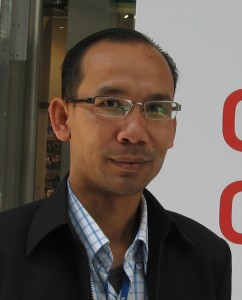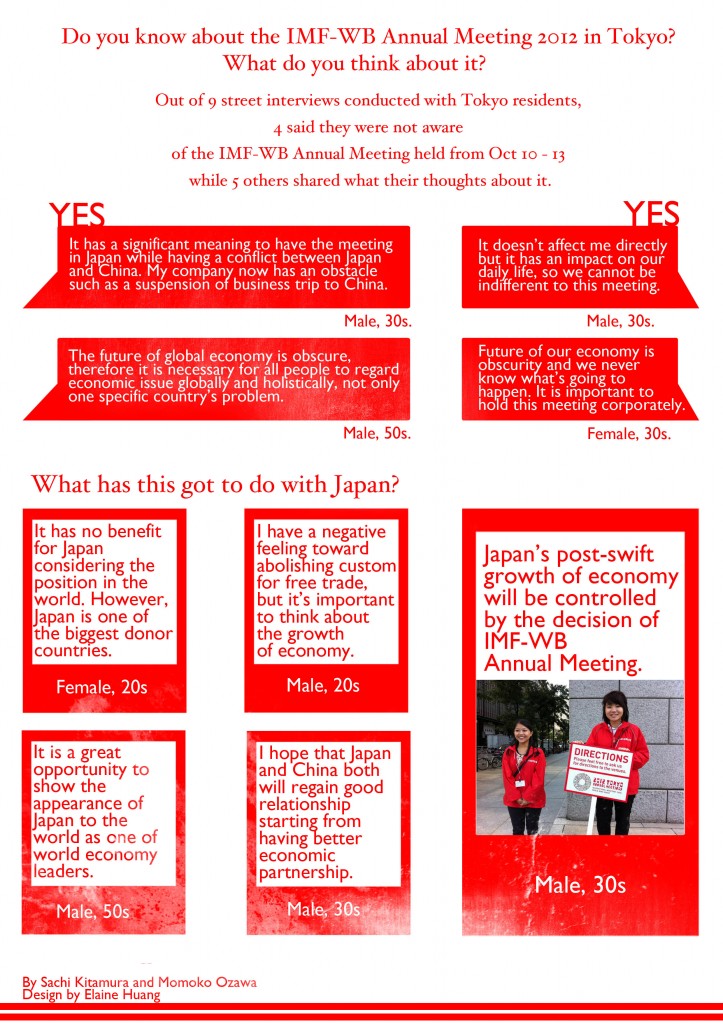Archive | Interviews

Tags: Asia Innovation Forum
Q & A: ‘Seeds of Innovation Are Everywhere’
Posted on 13 October 2012 by json
TOKYO, Oct 13 – That old saying “necessity is the mother of innovation” comes to mind as a restless world seeks global solutions in the face of nagging economic maladies that affect big and small nations and communities alike. Against this backdrop, the Asia Innovation Forum 2012, a two-day event on Oct. 12-13, 2012, brought together a mix of creative minds to exchange views and explore ways to create what organisers called a “chemical reaction” of fresh, productive ideas. Continue Reading

Tags: aid, Cambodia, poverty, youth
Q & A: Poverty Limits Youth Capacity
Posted on 12 October 2012 by json
Mak Chamroeun, president of Khmer Youth Association, is the lone activist from Cambodia at the IMF-WB Annual Meetings in Tokyo, Japan. He chats with IPS Asia-Pacific TerraViva’s Sam Rith about what he learned from the meetings.
TerraViva: What have you learned from these meetings?
Mak: What I learned most relates to the youth, the shortage jobs for youth that the leaders of IMF and World Bank are very interested in. I found that there are a lot of joblessness among the youth, and that there will be more cooperation to resolve the economic crisis, youth issues, and joblessness. I have listened to different guest speakers in different seminars during the IMF-World Bank meetings talk about how to resolve the joblessness of the youth. They said that SMEs play very important role (in this). I found out that the leaders of IMF and World Bank showed high commitment not (only to) reduce the poverty, but to end poverty.
TerraViva: What are the challenges that Cambodian youth face today?
Mak: Cambodian youth now are facing illiteracy, lack of education, lack of skills that the market requires. Not many of our youths now participate in implementing political, democracy, human rights and local governance. We have about 8 million youths, about 60 to 65 percent of the population. We do not have parliamentarians aged below 35. Each year, thousands of students graduate from schools and colleges but there is no working opportunity in their local areas. The other issue is that the poverty limits them from being able to get education, health treatment and other services. Drugs are still a problem.
TerraViva: Cambodia has been receiving a lot of aid from developed countries, World Bank, IMF and others after the civil war. How important will aid continue to be for the country?
Mak: We still need aid from outside because the government has not yet managed effectively to raise internal resources including natural resources, human resources and others.

VIDEO: Don’t Rush Into Burma, Foreign Donors told
Posted on 12 October 2012 by elainehuang
Khin Ohmar, Coordinator of Burma Partnership, explains to Johanna Son of IPS Asia-Pacific her worries about foreign donors rushing into Myanmar in the wake of its reforms.
This interview was conducted at the IMF-WB Annual Meetings 2012, Tokyo.
‘We’re Not Saying Don’t Go In, But Don’t Rush In’ from IPS Asia-Pacific on Vimeo.
You can read the main story here.
With the Support of:

-
CATEGORIES
- Dateline Earth (4)
- Featured (4)
- Interviews (4)
- News (14)
- Reporters' Notebook (10)
- Scenes (2)
- Views (1)
-
ARCHIVES
- October 2012 (34)







